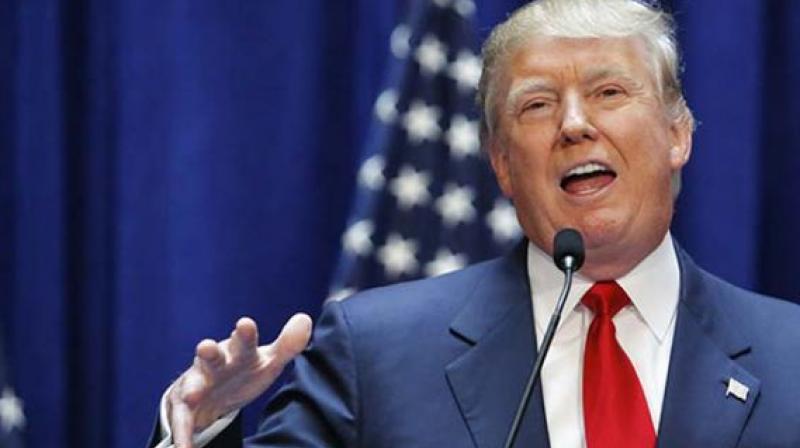Trump says 'fire and fury' warning to N Korea maybe wasn't tough enough'
Trump in his new remarks also warned North Korea it should be 'very, very nervous' of consequences if it even thinks of attacking US.

Washington: President Donald Trump on Thursday hardened his warning that North Korea would face "fire and fury" if it kept threatening the US, saying maybe that tough talk "wasn't tough enough".
But US Defense Secretary Jim Mattis appeared to step back from his boss' dire rhetoric, describing the prospect of war as "catastrophic" and adding that diplomatic efforts to solve the North Korea nuclear crisis were yielding results.
Trump in his new remarks Thursday also warned North Korea it should be "very, very nervous" of the consequences if it even thinks of attacking US soil, after nuclear-armed Pyongyang said it was readying plans to launch missiles towards the Pacific territory of Guam.
The Republican billionaire dismissed any criticism of his "fire and fury" warning of Tuesday, citing threats made by the regime of Kim Jong-Un to both Washington and its allies.
"It's about time that somebody stuck up for the people of this country and for the people of other countries. So if anything, maybe that statement wasn't tough enough," Trump said.
Trump also said China, Pyongyang's main diplomatic ally, could "do a lot more" to pressure Kim to end his country's nuclear weapons and ballistic missile programs.
Trump's comments, made from his golf club retreat in New Jersey, came after the North announced a detailed plan to send four missiles over Japan and towards Guam, where some 6,000 US soldiers are based.
Pyongyang said the scheme to target the island, a key US military outpost in the western Pacific, was intended to "signal a crucial warning" as "only absolute force" would have an effect on a US leader "bereft of reason".
Trump fired back with gusto.
"If North Korea does anything in terms of even thinking about an attack on anybody we love or we represent or our allies or us, they can be very, very nervous," he told reporters, with Vice President Mike Pence at his side.
"And they should be... because things will happen to them like they never thought possible."
- 'Better get their act together' -
Relations between Washington and Pyongyang have been tense for months, in the wake of the North's repeated missile tests, including two successful intercontinental ballistic missile (ICBM) test launches in July that brought much of the US mainland within range.
The escalating saber-rattling took an unexpected turn Tuesday when Trump seemed to borrow from the North's arsenal of rhetoric and said it faced "fire and fury like the world has never seen" if it continued to threaten the US.
Pyongyang then threatened the missile strike near Guam.
The war of words has set off diplomatic alarm bells, and raised fears of a miscalculation that could lead to catastrophic consequences on the Korean peninsula and beyond.
The region is facing "a mini Cuban missile crisis," John Delury, a professor at Seoul's Yonsei University, told AFP.
In California, Mattis appeared intent on dialing back the tension, explaining his mission and responsibility was to have military options ready "should they be needed" but stressing the US effort is currently focused on diplomacy.
"The tragedy of war is well-enough known it doesn't need another characterization beyond the fact that it would be catastrophic," he added.
The UN Security Council at the weekend passed a new set of sanctions against Pyongyang over its weapons program, including bans on the export of coal, iron and iron ore, lead and lead ore as well as fish and seafood.
The new punishment could cost North Korea $1 billion a year, and even ally China voted for the US-drafted proposal.
Trump once again suggested that he expected China to "do a lot more" to bring North Korea into line.
"I will tell you this, North Korea better get their act together or they're going to be in trouble like few nations have ever been in trouble in this world, okay?" he added.
- Unusual detail -
The North's unusually precise statement regarding Guam said its four missiles would be launched simultaneously and overfly the Japanese prefectures of Shimane, Hiroshima and Kochi.
They would have a flight time of 17 minutes 45 seconds, travel 3,356.7 kilometers (around 2,086 miles) and come down 30 to 40 kilometers away from Guam, it said -- just outside US territorial waters.
Analysts said such a launch would put the US in a dilemma: if it did not try to intercept the missiles, its credibility would be damaged and the North would feel emboldened to carry out a full-range ICBM test.
But if an intercept were attempted and failed in any way, it would undermine the effectiveness of the United States' ballistic missile defense system.
China is the North's key ally and trading partner, but a state-run newspaper said Friday that it should not intervene on Pyongyang's side if it triggered a conflict.
Beijing should "make clear that if North Korea launches missiles that threaten US soil first and the US retaliates, China will stay neutral," the nationalistic Global Times said in an editorial.
Calls mounted in South Korea for Seoul to develop atomic weapons of its own in light of the situation, with the Korea Herald saying in an editorial: "Now is time to start reviewing nuclear armament."
A South Korean bomb would infuriate Pyongyang, which says it needs nuclear weapons to defend itself against the threat of invasion, and make bringing it to the negotiating table even harder.

